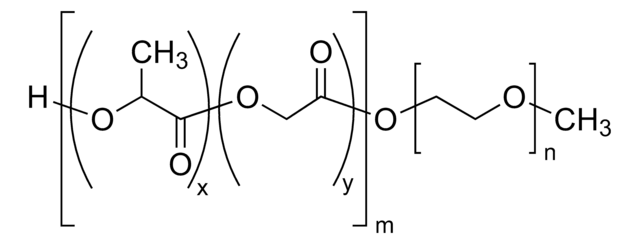おすすめの製品
形状
solution
分子量
Mw ~20,000 g/mol
濃度
25 wt. % (solution in water)
色
clear colorless to pale yellow
官能基
hydrazide
保管温度
2-8°C
関連するカテゴリー
アプリケーション
In addition, the physical properties of the resulting hydrogels, such as LCST, gelation rates, swelling kinetics, degradation kinetics, and mechanical properties, can all be readily controlled by solution concentration and the ratios of each solution.
This product is provided as a 25 wt% solution in water, ready to be diluted for your specific application. Please see the technical bulletin on the product page for dilution instructions and hydrogel preparation instructions.
This product is provided as a 25 wt% solution in water, ready to be diluted for your specific application. Please see the technical bulletin on the product page for dilution instructions and hydrogel preparation instructions.
Poly(diethylene glycol methacrylate)-co-(oligoethylene glycol methacrylate), (PM(EO)2MA-co-OEGMA) is a comb-shaped, graft copolymer consisting of hydrophilic oligomer polyethylene glycol (PEG) chains grafted to a hydrophobic polymethacrylate backbone. In this material, the PEG chains are either diethylene glycol units or oligomer PEG (n=8-9) units. Resulting material properties can be tuned by controlling the ratio of each component. POEGMA has been suggested as a viable alternative to PEG in biological and biomaterial applications. POEGMA has been reported to improve pharmacokinetic properties of protein and peptide conjugates, enhance the stability and gene silencing efficiency of siRNAs, as an anti-fouling surface for biosensors, and eliminate PEG antigenicity. In addition to use in biomolecule-polymer conjugates, PEOGMA has also seen wide spread use in tissue engineering applications, such as hydrogel synthesis. Hydrazide-functionalized PM(EO)2MA-co-OEGMA can be readily used with the corresponding aldehyde-functionalized POEGMA or PM(EO)2MA-co-OEGMA for rapid gelation via reversible hydrazone bond formation. Due to the reversibility of the bond formation and the low viscosity of the precursors, resulting hydrogels can be used as injectable tissue engineering matrices, local drug delivery vehicles for small molecules, or as joint lubricants.
保管分類コード
10 - Combustible liquids
WGK
WGK 3
引火点(°F)
Not applicable
引火点(℃)
Not applicable
適用法令
試験研究用途を考慮した関連法令を主に挙げております。化学物質以外については、一部の情報のみ提供しています。 製品を安全かつ合法的に使用することは、使用者の義務です。最新情報により修正される場合があります。WEBの反映には時間を要することがあるため、適宜SDSをご参照ください。
Jan Code
901546-1G:
901546-VAR:
901546-BULK:
試験成績書(COA)
製品のロット番号・バッチ番号を入力して、試験成績書(COA) を検索できます。ロット番号・バッチ番号は、製品ラベルに「Lot」または「Batch」に続いて記載されています。
A brush-polymer/exendin-4 conjugate reduces blood glucose levels for up to five days and eliminates poly(ethylene glycol) antigenicity.
Qi Y, et al.
Nature Biomedical Engineering, 1, 0002-0002 (2016)
Reactive electrospinning of degradable poly(oligoethylene glycol methacrylate)-based nanofibrous hydrogel networks.
Xu F, et al.
Chemical Communications (Cambridge, England), 52, 1451-1454 (2016)
Niels M B Smeets et al.
Chemical communications (Cambridge, England), 50(25), 3306-3309 (2014-02-18)
Injectable PEG-analogue hydrogels based on poly(oligoethylene glycol methacrylate) have been developed based on complementary hydrazide and aldehyde reactive linear polymer precursors. These hydrogels display the desired biological properties of PEG, form covalent networks in situ following injection, and are easily
Weiping Gao et al.
Proceedings of the National Academy of Sciences of the United States of America, 106(36), 15231-15236 (2009-08-27)
The challenge in the synthesis of protein-polymer conjugates for biological applications is to synthesize a stoichiometric (typically 1:1) conjugate of the protein with a monodisperse polymer, with good retention of protein activity, significantly improved pharmacokinetics and increased bioavailability, and hence
Imran Ozer et al.
Biomacromolecules, 18(9), 2699-2710 (2017-08-05)
PEGylation, covalent attachment of PEG to therapeutic biomolecules, in which suboptimal pharmacokinetic profiles limiting their therapeutic utility are of concern, is a widely applied technology. However, this technology has been challenged by reduced bioactivity of biomolecules upon PEGylation and immunogenicity
ライフサイエンス、有機合成、材料科学、クロマトグラフィー、分析など、あらゆる分野の研究に経験のあるメンバーがおります。.
製品に関するお問い合わせはこちら(テクニカルサービス)







